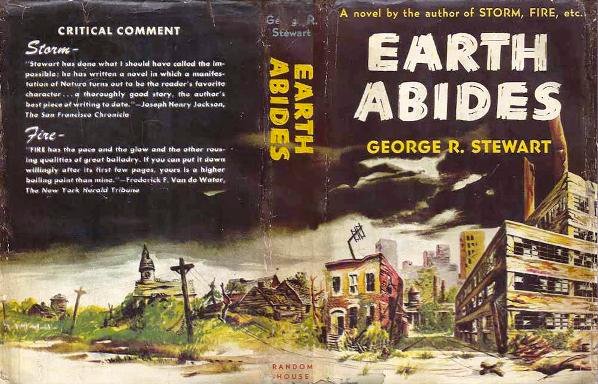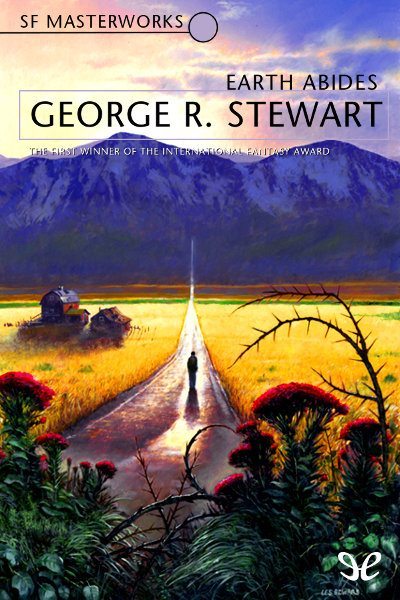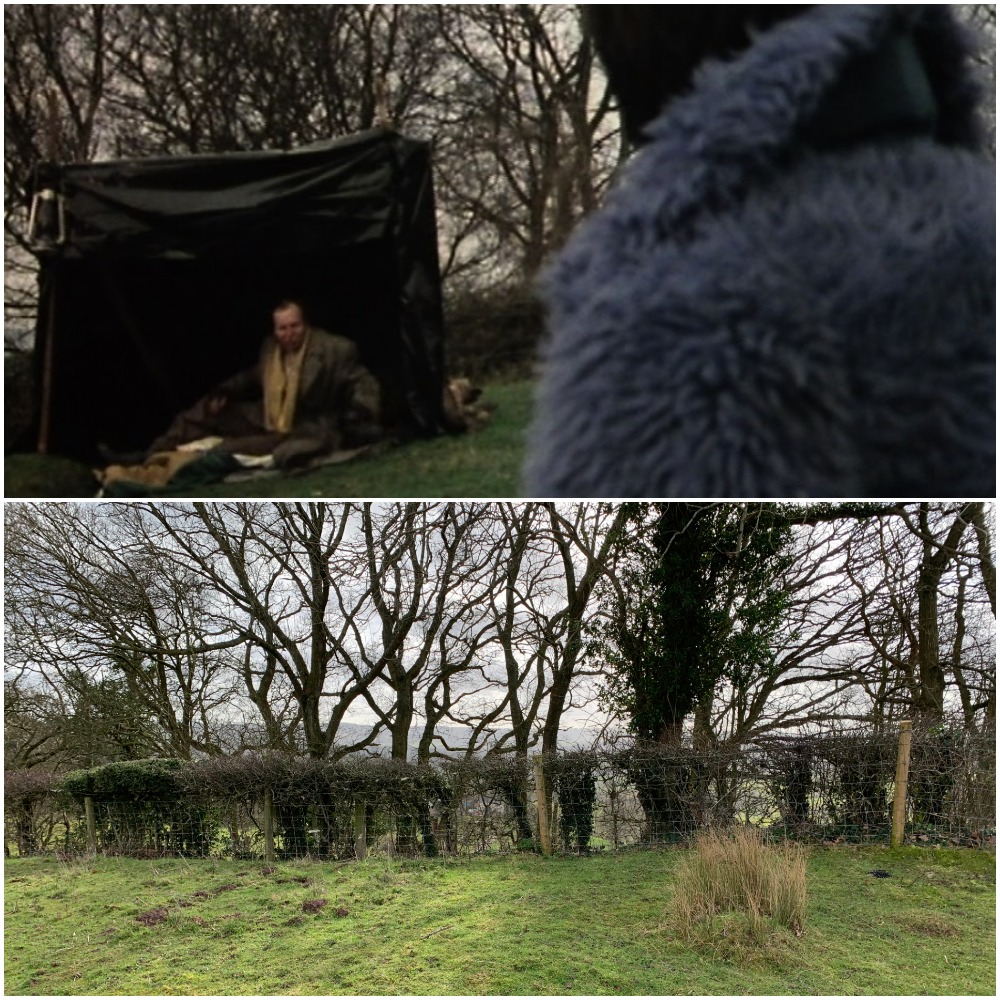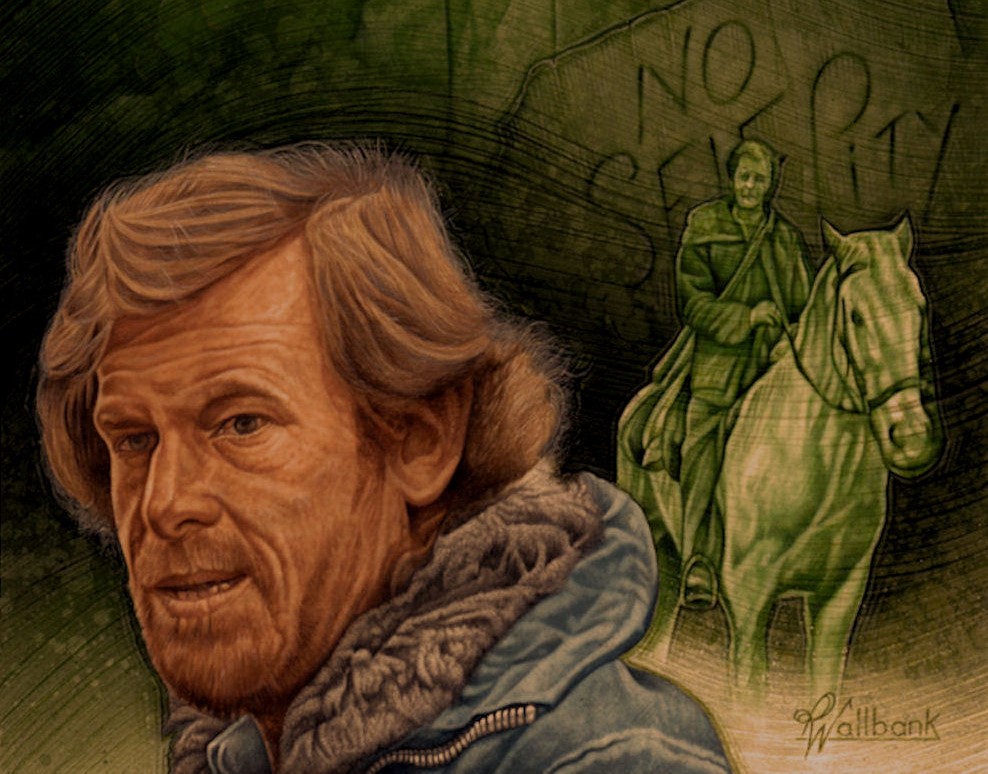
GEORGE R STEWART, Earth Abides: Ballentine Books, USA, 1983, £4.29, ISBN 0-449-21301-3; and, Millenium Books, UK, 1999, £6.99 ISBN 1-857-98821-3. Both US and UK paperback editions are currently in print.
What distinguishes Earth Abides from both Survivors and other post-apocalyptic novels (including Alas Babylon) is the scale and the scope of its narrative. First published in the USA in 1949, Earth Abides is a tale of civilization's fall that is epic in both conception and execution. This is a novel of huge ambition.
For the most part, this story of a ragtag community's struggle to survive in a world laid waste is as credible and sharply evoked as it is insightful and perceptive. While the story focuses, in the main, on the travails of a single experimental settlement, the novel's reach across both space (the vast distances of Middle America) and time (the passage of some six decades and more) offers the reader a compelling vista of post-Death life. It is one which allows the author to develop rich themes that in Survivors' three year story arc can only remain the stuff of speculation. In Earth Abides, Stewart explores what might happen when the last shotgun cartridge has been fired; when future generations confront the task of rebuilding the old world left to them by their forebears; when the battle between superstition and reason has been settled by the victory of one worldview over the other. It is Stewart's decision to push his time frame forward so effectively that ultimately makes Earth Abides such a powerful survival tale.
Remote research retreat
As the novel begins, Isherwood Williams ('Ish', to his few friends), a solitary and self-possessed academic, returns from a remote research retreat to discover a world decimated by a plague of 'super-measles' that has left hundreds of millions dead. To Ish's initial disbelief, the 'world has ended' in his absence. Ish begins a desperate search for fellow survivors around the deserted suburbs of his native San Francisco. Here he encounters shocked, lost and rootless individuals, in fleeting meetings that confirm to Ish that their collective 'selection for survival' has been nothing more than random chance. Despairing of his desolate home town, and with only a free-spirited dog for company, Ish embarks on a cross-country road trip to survey the devastation of other states first hand. After just a few days' travel he is left in no doubt that his society's collapse has been total, and that there is nowhere left for him to escape to.
Returning home now convinced of the need to establish some kind of settlement, Ish draws together a fragile and ill-sorted founding group, and sets up his new society in the shadow of the now-rusting Golden Gate Bridge. Earth Abides evolves to tell the story of that community's struggles over the next sixty-plus years, as its members confront the challenges of the post-plague world and generations are born and raised that know nothing of the time before the Death.
There are so many resonances of Survivors in Earth Abides that it seems inconceivable that it was not an important reference source for Terence Dudley, Terry Nation or others involved in framing the series. Some of the similarities are direct: the looter strung up with a warning sign around his neck; the threat posed by roaming packs of dogs, plagues of rats and other vermin; the scavenging preoccupations of the first few weeks; a community vote on a death sentence for a suspected criminal in their midst, and many others.
Stored human knowledge
Echoes from Survivors are also found in some of the story's wider themes: the passionate drive of a minority of survivors determined to build a new society; the unparalleled significance that books, professional expertise and stored human knowledge now have; the critical role that education of the young might play; the balance that must be struck between working to better the lot of future generations and making life endurable, maybe even pleasurable, in the present.
Yet the lengthy time span explored in Earth Abides allows it to develop themes untouched in Survivors. Intriguingly, Williams suggests that post-plague generations might have very different priorities from those still mourning the loss of the old world. That could make it hard to convince the young that previous human experiences have any relevance in the world that now surrounds them. In a development that would also have exasperated Charles Vaughan, Williams concludes that the natural tendencies in his community would are towards introspection and the short term gratification of needs and wants. It is significant that while Survivors develops into an account of how the first power stations are brought back on-line some three years after the Death, Earth Abides is a tale in which the loss of electricity and automation is accepted as permanent. In one of the book's most evocative passages, the dimming and failing of the lights in Isherwood's home and in the city around him serves as graphic confirmation of the irrevocable collapse of civilization.

Williams shares with Vaughan and Preston a passionate commitment to the construction of a new world amidst the ruins of the old, yet his project come to a rather different conclusion than that revealed in the last episodes of Survivors. In Earth Abides, Ish draws up an enterprising plan for his community's development, and tries to rally his neighbours and their families behind it, yet none seem to fully share his urgent sense of mission. Other preferences and distractions always conspire to frustrate Ish's ever more modest projects, as his fellow survivors find their attention pulled towards the immediate.
Promising protégé
At the conclusion of Survivors, Charles, Jenny and Hubert head south confident that a rudimentary network of communities and a putative 'council' has begun to function, and that hydroelectric power is flowing once again. After the loss of what Isherwood considers his most promising protégé, he resigns himself to the futility of his grand social scheme and scales back his expectations, committing himself instead to 'work with the grain' of the human material around him. It is a momentous decision, all the more so because so few of the community are aware that he has reached such a judgement, but it serves to relieve Isherwood of many of the burdens and frustrations of leadership he has begun to resent. From that point on he looks instead to pass on more basic skills, like those of bow-and-arrow hunting, and abandons efforts to inspire interest in the dusty tomes on the library shelves, or to force the children to attend the rudimentary community school. As the new generations grow up around him, Isherwood's role as catalyst and educator is usurped by others, and he increasingly adopts the mantle of arbiter and figurehead - his simple wooden-handled hammer (his constant companion since the days of the plague) taking on an uncertain mystical significance for many of the community's children.
Stewart makes good use of several key narrative devices. The introduction of a series of 'quick' chapters, that compress the experiences of years or decades, offering only the briefest sketch of events within them, allows Stewart to explore the extended time span, direct the pace of each sequence, and return the story to close detail at significant moments. Ish makes for an engaging central character, his temperament as a reflective, articulate and highly-driven individual, and his musings on the nature of the world as it is and as he perceives it should be, draw in and challenge the reader. Stewart also envokes the voice of a detached narrator, whose words record without judgement the relentless decay of the old order of things, and the rise of nature to reclaim the territory borrowed from it. This mechanism provides the reader a fascinating perspective on events and their causes, that the characters, struggling with their shared predicament, lack. It helps to emphasise their apparent powerlessness against the combined forces of nature, and underlines their inability to hang on to the resources of the world that they have lost.
Human imperfection
Stewart populates the core community with a range of believable characters, although the picture of human imperfection and frailty that he draws with them is a harsh, even a judgemental and pessimistic, one in many respects. As with Alas, Babylon, Earth Abides itself needs to be judged as a product of its writer's own times, and individual readers will assess the often dubious gender and racial politics of the piece differently. Isherwood's partner Em is the central strong female character, vital to the health of the community, and always providing resilient and stoical support to her husband behind the scenes. At odd moments, Em also functions as a metaphoric 'mother of all nations' — a somewhat crass and overdrawn image that features in some of the very few leaden and melodramatic moments in the book.
The community confronts challenges of all kinds as the years pass, struggling with pestilence, plague and set backs of all kinds. Births and marriages occur side by side with natural disasters and epidemics. Illness is endured, as sickness returns to haunt the community, and death again becomes common place. Still the numbers in the settlement grows as new generations flourish. At the book's conclusion, the last of the original Survivors have passed on, and the future of humanity rests in the hands of their, very different, descendants. Humanity's grip over the planet remains tenuous, its members vulnerable to threats of all kinds, but there is a sense of 'equilibrium re-established' in the crude alliance of hunter-gatherer tribes forged within the ring of settlements that define the horizons of this community's world. Nature, meanwhile, remains triumphant, reclaiming control of the fabric of civilization and asserting its permanence against the transitory intrusions of industry, steel, concrete and cement. Civilization may be impermanent - humanity too — but the earth itself will endure.
The author's belief in the essential invincibility of nature may appear — to those of us living in an era defined by ozone depletion, genetic modification and global warming — as a touchingly innocent notion. But, whatever its merits, it provides the necessary optimistic balance to the melancholy, sadness and regret with which much of this tale of humanity's fall is infused.
Rich Cross
Cite this web page
Cross, R. (2021). 'George R Stewart: Earth Abides,' [online] Survivors: A World Away, 31 January. Available at: https://www.survivors-mad-dog.org.uk/a-world-away/Archive_Rev_EE.php. Accessed on: 03 March 2026.
Current style: Harvard
TAGS








